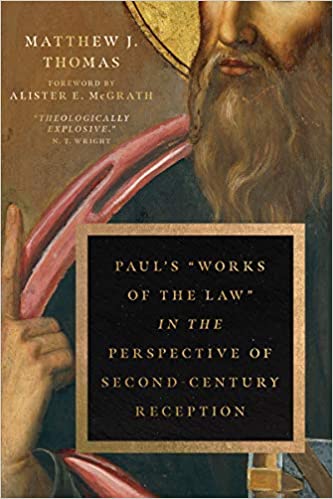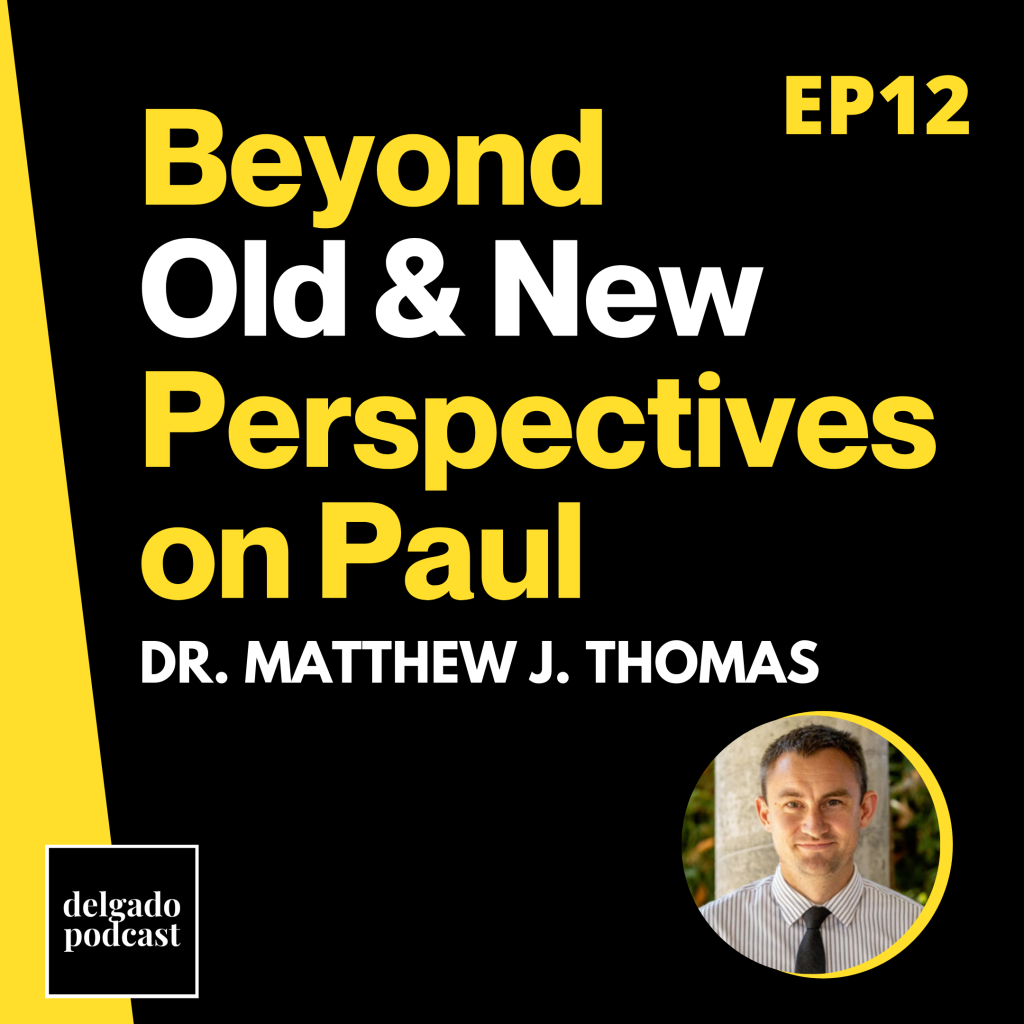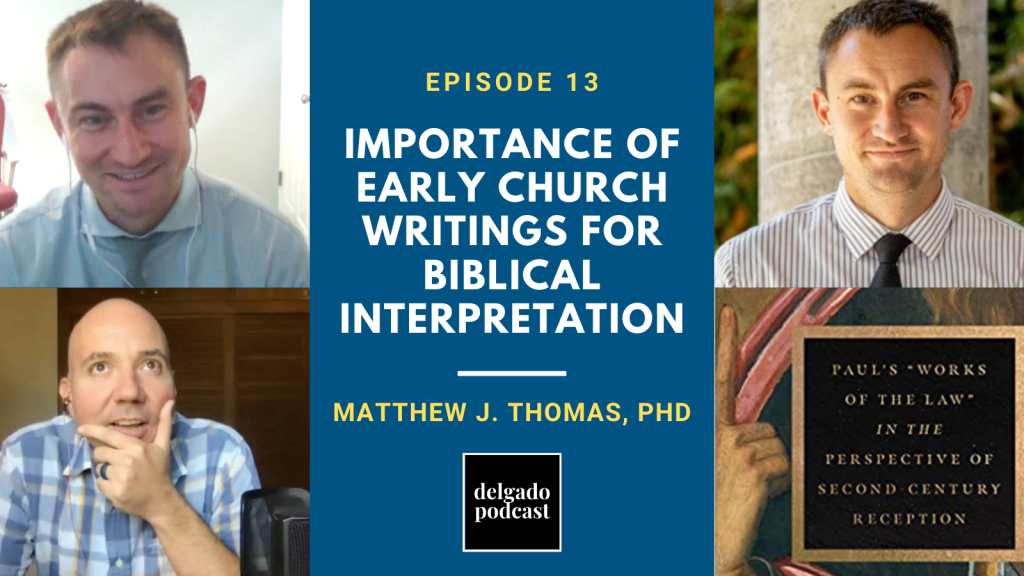 We’re grateful for the opportunity to learn from Dr. Matthew J. Thomas about his book “Paul’s ‘Works of the Law’ in the Perspective of Second Century Reception” published by IVP Academic Press.
We’re grateful for the opportunity to learn from Dr. Matthew J. Thomas about his book “Paul’s ‘Works of the Law’ in the Perspective of Second Century Reception” published by IVP Academic Press.
Dr. Thomas spent nearly nine years studying early church writings and scholarship focused on Paul’s writings on the works of the law, which led to his doctoral thesis on this topic at Oxford University.
Thomas’ fascinating and helpful scholarship builds on research by Markus Bockmuehl, Dean Ireland’s Professor of the Exegesis of Holy Scripture at Oxford University, and received praise from Alister E. McGrath, John M.G. Barclay, N.T. Wright and dozens of other Biblical scholars.
This podcast with Dr. Thomas includes a discussion on his personal spiritual journey, what led him to pursue ministry and academic research, ways he’s navigated difficult Biblical texts, why reading early church writings are crucial for understanding the context of New Testament writings, why Calvin disagreed with Augustine and Jerome, ways to understand the old and new perspectives on Paul (as well as the earliest church perspectives), why Origen is sometimes misunderstood, and a discussion on the conflict between Pelagius and Augustine regarding the use of the law in salvation.
You can subscribe or download this episode on iTunes, Spotify, Google Podcasts or Stitcher. You can also watch or subscribe to the video series on YouTube.
worthlessly Here is an overview of the two conversations with Dr. Thomas:
EP12: Beyond Old & New Perspectives On Paul: Faithfulness & Works
In this episode, Dr. Thomas talks with us about writing his latest book, which digs into what the early church understood by Paul when he referred to works of the law. He also shares his spiritual journey into faith, his academic studies on scripture and the early church, ways that theologians have divided over this pivotal issue of justification by faith vs. faithfulness, how reformers like Calvin and Luther diverged from early church fathers, and why second-century writers can give us the clearest view of how these perplexing Biblical passages were meant to be understood.
no prescription generic Misoprostol Listen or download the episode here:
EP13: Importance of Early Church Writings for Biblical Interpretation
Dr. Matthew Thomas talks with us about why early church writings (especially texts written in the second century) provide us keys to earliest understandings of the Bible. He discusses writings by Irrenaeus (who was a disciple of Polycarp — who was discipled by John), the Epistle to Diognetus, Justin Martyr’s First Apology and Dialogue with Trypho, and the problem with Christian churches that aren’t linked to denominations — and why early church writings can help Christians understand their foundational theological identity. The episode ends with a detailed explanation of Paul’s meaning of faith and works.
Listen or download the episode here:
Some takeaways from the discussion:
Scholars and theologians have debated throughout the ages on what Paul has meant regarding justification by faith and the role of works in salvation. There is a rich history of debate and evolution of thinking on Paul’s insights on how salvation works. It’s important to acknowledge the different perspectives and gain empathy for each other’s perspectives on these different passages.
Second-Century perspectives on Paul’s writings are keys to understanding what Paul actually meant. As you know, understanding our Bible can be difficult when we don’t have insight into the culture, background, language and intention of the author. One clue to getting better insight into authorial intent is to read what others at that time understood by the texts when first shared out. Paul’s ideas were discussed at length by the early church and we have the writings of the Apostolic Fathers available for anyone to read. These are texts that we should all spend time getting familiar with.
Early church writings and studying church history can help us discover our spiritual identity. Dr. Thomas talked about how many of us like to use services like 23andMe to learn about our ethnic backgrounds — and how studying the early church writings can help us uncover our own spiritual identity. After all, these are the writings of the people who helped pass along key theological understandings of these ancient Biblical texts. These are also the closest ones to the actual New Testament writers.
Old perspectives on Paul are not quite the oldest — and the newest perspectives are more like the earliest. Dr. Thomas explains how the old perspectives on Paul — and how many reformed thinkers like Calvin and Luther viewed Paul’s ideas on justification by faith is actually quite different (and opposed to) the earliest church viewpoints, especially those of Augustine. The newest perspectives on Paul’s ideas on justification — as promoted by theologians like N.T. Wright and Dunn — have more alignment with the early church positions. It can all seem like a complicated hot mess for those of us that don’t study theology, but it shows how theological positions vary within the church, even on pivotal doctrines like justification and role of works.
The importance of faithfulness is important to Roman Catholic, Protestant and Eastern Orthodox churches, but how much faithfulness plays a role in salvation is where Protestants often differ the most. The key differentiator is how we translate Paul’s wording on justification. Is it faithfulness or belief? The way we answer that question can push us toward specific theological frameworks.
Searching for truth and meaning in scripture reveals the dynamic nature of Biblical interpretation throughout church history. One reason to spend time studying theology and church history is because it exposes you to different Biblical interpretations and how those ideas evolved over time. It reveals they dynamic nature of Biblical interpretation and will give you more empathy for different religious perspectives and truths to live by.
Video of part one:
Video of part two:


Matthew J. Thomas
Matthew J. Thomas (DPhil, University of Oxford) is assistant professor of biblical studies at the Dominican School of Philosophy and Theology in Berkeley, California, and an instructor in theology with Regent College, Vancouver.
Check out more episodes from the Delgado Podcast.
To keep up with this weekly podcast series featuring academics, authors and artists who challenge us, you can get updates on Instagram and Twitter or subscribe to the video interviews on YouTube. Reach out with any suggestions for authors to feature, topics to discuss and share your thoughts on an episode.

